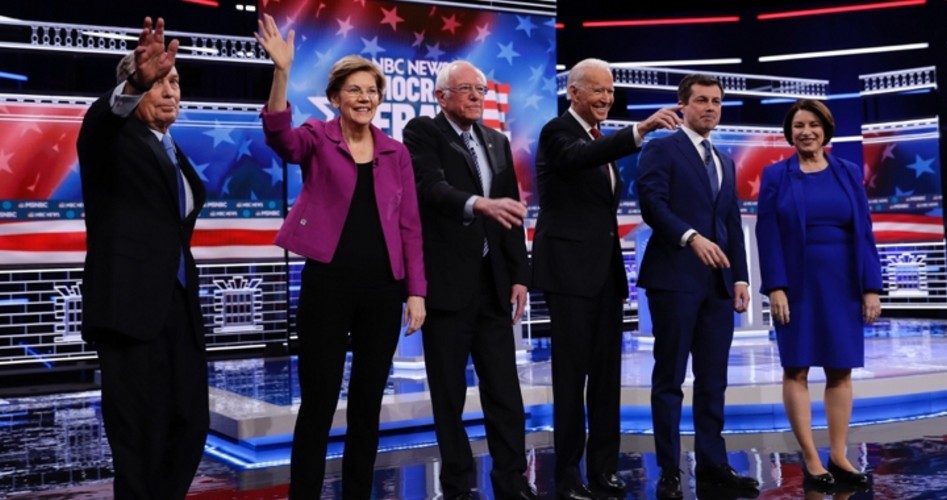
Podcast: Play in new window | Download ()
Subscribe: Android | RSS | More
Despite being targeted by his Democrat opponents during Wednesday night’s so-called debate, Mike Bloomberg’s strategy remains in place: to fracture the race so that no one wins on the first ballot at the Democratic National Convention in Milwaukee in July.
Bloomberg seized on the first question from an NBC moderator by telling the audience that Bernie Sanders (Bloomberg’s next target now that Biden is fading in the stretch) would lose to the president because of his healthcare proposal that would replace private coverage with government-run socialized healthcare: “I don’t think there’s any chance of the senator [from Vermont] beating President Trump. If he [Sanders] is the candidate, we will have Donald Trump for another four years, and we can’t stand that.”
He broadened his attack on his opponents near the end of the debate: “I can’t think of a way to make it easier for Donald Trump to get reelected than listening to this conversation. This is ridiculous. We’re not going to throw out capitalism. We tried that. It’s called communism and it doesn’t work.”
Philip Klein, writing for the Washington Examiner, noted that the candidates have essentially agreed with Bloomberg’s strategy of disruption: “None of Bernie Sanders’ Democratic rivals are very confident that they will stop him from winning the most delegates.… Instead they are hoping that if enough of them win a sufficient number of delegates, they could at least deny him a majority, and then fight things out on the convention floor [in July].”
That’s the fight that Bloomberg and his advisors have been preparing for since November when he first announced for the party’s nomination.
What has his $400 million bought him? Bloomberg has roared from invisible in national polling to third place, according to the RealClearPolitics latest aggregate polling results, ahead of Elizabeth Warren, Pete Buttigieg, and Amy Klobuchar, and nipping at the heels of Joe Biden.
What else has his record spending bought him? Rosie Gray, a reporter for BuzzFeed, calls his campaign “the Death Star of presidential campaigns”: destroying everything in its path. He employs more people in more states than any of his opponents. He pays them well, estimated to be around $6,000 a month at the entry level. He provides them with a catered three meals a day and a free iPhone 11. He pays for sound stages to use for creating the hundreds of commercials that are ubiquitous (seen on Facebook, The Weather Channel, the Golf Channel, the Super Bowl, and elsewhere).
He is buying off the superdelegates he’ll need in the second round of voting. He’s capturing more and more high-profile endorsements, wrote Gray, “from political figures to whom he had generously donated in the past or supported causes connected to them.” This is called “the Potomac Two-Step,” whereby chits generated in the past are being called in.
Bloomberg’s strategy was working even before Wednesday night’s debate. Hours before that debate, the polling analysis website FiveThirtyEight announced that “our model is fairly confident it’ll be Sanders who gets a plurality [of delegates at the Democrat National Convention]. The big question is whether the other candidates stay competitive enough for long enough to deny him the majority he needs to win the nomination outright [on the first ballot].”
Bloomberg’s staff admitted that it might be a near thing. It issued a “State of the Race” memo to top staffers on Monday warning that “if Sanders moves past Super Tuesday with the 404 delegate lead we currently project he will have, it will be all but impossible to stop him from getting to a plurality (or even a majority) of pledged delegates.”
With Biden out of the way, the Bloomberg campaign can now focus on removing Sanders. With a limitless budget, there is no doubt that ads will now appear in key Super Tuesday states declaring that Sanders can’t beat Trump, leaving Bloomberg as the only candidate who can.
Once the first vote fails, then Bloomberg will have his way clear to nominate whomever he thinks does have a chance. The “Potomac Two Step” all but guarantees the outcome.
The only question will remain: Whom will Bloomberg anoint?
Photo: AP Images
An Ivy League graduate and former investment advisor, Bob is a regular contributor to The New American, writing primarily on economics and politics. He can be reached at [email protected].
Related articles:
Bernie and Bloomie: Is the Democrat Nomination Battle Now a Two-man Race?
Bookmakers Report Surge in Bloomberg Bets, Collapse of Biden’s



